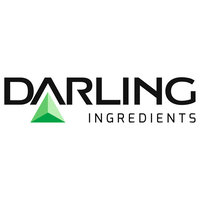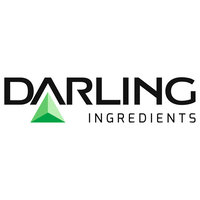
Darling Ingredients Inc
NYSE:DAR


| US |

|
Johnson & Johnson
NYSE:JNJ
|
Pharmaceuticals
|
| US |

|
Berkshire Hathaway Inc
NYSE:BRK.A
|
Financial Services
|
| US |

|
Bank of America Corp
NYSE:BAC
|
Banking
|
| US |

|
Mastercard Inc
NYSE:MA
|
Technology
|
| US |

|
UnitedHealth Group Inc
NYSE:UNH
|
Health Care
|
| US |

|
Exxon Mobil Corp
NYSE:XOM
|
Energy
|
| US |

|
Pfizer Inc
NYSE:PFE
|
Pharmaceuticals
|
| US |

|
Palantir Technologies Inc
NYSE:PLTR
|
Technology
|
| US |

|
Nike Inc
NYSE:NKE
|
Textiles, Apparel & Luxury Goods
|
| US |

|
Visa Inc
NYSE:V
|
Technology
|
| CN |

|
Alibaba Group Holding Ltd
NYSE:BABA
|
Retail
|
| US |

|
3M Co
NYSE:MMM
|
Industrial Conglomerates
|
| US |

|
JPMorgan Chase & Co
NYSE:JPM
|
Banking
|
| US |

|
Coca-Cola Co
NYSE:KO
|
Beverages
|
| US |

|
Walmart Inc
NYSE:WMT
|
Retail
|
| US |

|
Verizon Communications Inc
NYSE:VZ
|
Telecommunication
|
Utilize notes to systematically review your investment decisions. By reflecting on past outcomes, you can discern effective strategies and identify those that underperformed. This continuous feedback loop enables you to adapt and refine your approach, optimizing for future success.
Each note serves as a learning point, offering insights into your decision-making processes. Over time, you'll accumulate a personalized database of knowledge, enhancing your ability to make informed decisions quickly and effectively.
With a comprehensive record of your investment history at your fingertips, you can compare current opportunities against past experiences. This not only bolsters your confidence but also ensures that each decision is grounded in a well-documented rationale.
Do you really want to delete this note?
This action cannot be undone.

| 52 Week Range |
33
50.48
|
| Price Target |
|
We'll email you a reminder when the closing price reaches USD.
Choose the stock you wish to monitor with a price alert.

|
Johnson & Johnson
NYSE:JNJ
|
US |

|
Berkshire Hathaway Inc
NYSE:BRK.A
|
US |

|
Bank of America Corp
NYSE:BAC
|
US |

|
Mastercard Inc
NYSE:MA
|
US |

|
UnitedHealth Group Inc
NYSE:UNH
|
US |

|
Exxon Mobil Corp
NYSE:XOM
|
US |

|
Pfizer Inc
NYSE:PFE
|
US |

|
Palantir Technologies Inc
NYSE:PLTR
|
US |

|
Nike Inc
NYSE:NKE
|
US |

|
Visa Inc
NYSE:V
|
US |

|
Alibaba Group Holding Ltd
NYSE:BABA
|
CN |

|
3M Co
NYSE:MMM
|
US |

|
JPMorgan Chase & Co
NYSE:JPM
|
US |

|
Coca-Cola Co
NYSE:KO
|
US |

|
Walmart Inc
NYSE:WMT
|
US |

|
Verizon Communications Inc
NYSE:VZ
|
US |
This alert will be permanently deleted.
 Darling Ingredients Inc
Darling Ingredients Inc
 Darling Ingredients Inc
Revenue
Darling Ingredients Inc
Revenue
Darling Ingredients Inc
Revenue Peer Comparison
Competitors Analysis
Latest Figures & CAGR of Competitors

| Company | Revenue | CAGR 3Y | CAGR 5Y | CAGR 10Y | ||
|---|---|---|---|---|---|---|

|
Darling Ingredients Inc
NYSE:DAR
|
Revenue
$5.9B
|
CAGR 3-Years
10%
|
CAGR 5-Years
12%
|
CAGR 10-Years
6%
|
|

|
Fresh Del Monte Produce Inc
NYSE:FDP
|
Revenue
$4.3B
|
CAGR 3-Years
0%
|
CAGR 5-Years
-1%
|
CAGR 10-Years
1%
|
|

|
Ingredion Inc
NYSE:INGR
|
Revenue
$7.6B
|
CAGR 3-Years
4%
|
CAGR 5-Years
4%
|
CAGR 10-Years
3%
|
|

|
Bunge Ltd
NYSE:BG
|
Revenue
$59.5B
|
CAGR 3-Years
13%
|
CAGR 5-Years
5%
|
CAGR 10-Years
0%
|
|

|
Limoneira Co
NASDAQ:LMNR
|
Revenue
$191.5m
|
CAGR 3-Years
5%
|
CAGR 5-Years
2%
|
CAGR 10-Years
6%
|
|
|
A
|
Archer-Daniels-Midland Co
XETRA:ADM
|
Revenue
$87B
|
CAGR 3-Years
3%
|
CAGR 5-Years
6%
|
CAGR 10-Years
0%
|
|
Darling Ingredients Inc
Revenue Breakdown
Breakdown by Geography
Darling Ingredients Inc

|
Total Revenue:
6.8B
USD
|
|
North America:
4.2B
USD
|
|
Europe:
1.7B
USD
|
|
South America:
534.1m
USD
|
|
China:
308.6m
USD
|
|
Other Geographical Areas:
88.3m
USD
|
Breakdown by Segments
Darling Ingredients Inc

|
Total Revenue:
6.8B
USD
|
|
Feed Ingredients:
4.5B
USD
|
|
Fats:
1.9B
USD
|
|
Food Ingredients:
1.8B
USD
|
|
Proteins:
1.7B
USD
|
|
Food Ingredients, Products And Services:
1.5B
USD
|
|
Bioenergy:
563.4m
USD
|
|
Fuel Ingredients:
563.4m
USD
|
|
Used Cooking Oil:
497.7m
USD
|
|
Bakery:
255.2m
USD
|
|
Other Rendering:
243.5m
USD
|
|
Other, Products And Services:
175.3m
USD
|
Darling Ingredients Inc
Glance View
In the ever-evolving landscape of sustainability and waste management, Darling Ingredients Inc. stands out as a pioneering force, transforming what many consider waste into valuable resources. Originally rooted in the rendering industry, the company has significantly expanded its horizons over the decades. Darling Ingredients takes discarded animal by-products and used cooking oils, weaving them into something of worth — producing renewable energy, animal feed, and specialty food ingredients. This transformation process involves the collection and processing of raw materials, where the biochemical makeup of the discarded materials is meticulously reengineered and repurposed. The company's operations resonate with an impressive blend of environmental responsibility and economic viability, showcasing its commitment to a circular economy. What truly sets Darling Ingredients apart on a global stage is not just its unique operational model, but its ability to identify and maximize revenue streams from diverse outputs. From biodiesel and collagen peptides to fertilizers and gelatin, the by-products span multiple industry segments, creating a diversified portfolio that buffers the company against market volatility. Additionally, the firm is consistently looking at the growing demand for sustainable and alternative natural resources, fortifying its footing by collaborating closely with industries that rely heavily on ecologically friendly practices. With such a strategic approach, Darling Ingredients generates revenue not merely by selling renewable products but also by aligning itself with global sustainability trends, effectively turning environmental stewardship into a thriving business model.

See Also
What is Darling Ingredients Inc's Revenue?
Revenue
5.9B
USD
Based on the financial report for Sep 30, 2024, Darling Ingredients Inc's Revenue amounts to 5.9B USD.
What is Darling Ingredients Inc's Revenue growth rate?
Revenue CAGR 10Y
6%
Over the last year, the Revenue growth was -15%. The average annual Revenue growth rates for Darling Ingredients Inc have been 10% over the past three years , 12% over the past five years , and 6% over the past ten years .






























 You don't have any saved screeners yet
You don't have any saved screeners yet